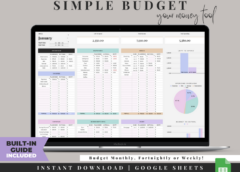The Five Fundamentals of Financial Fitness: A Comprehensive Guide to Mastering Your Finances
The Five Fundamentals of Financial Fitness: A Comprehensive Guide to Mastering Your Finances In today’s fast-paced world, financial planning can seem overwhelming, especially when basic principles are often overlooked.…
Diving Deeper into Budgeting: Exploring Effective Strategies for Financial Wellness
Budgeting is an essential aspect of financial wellness, and there is no one-size-fits-all approach. Different people have varying needs and circumstances, and thus, different budgeting strategies can be applied. Whether…
Setting Priorities in Your Budget: An Detailed Approach to Financial Stability
Creating a budget is more than just listing your expenses and income; it’s about prioritizing your financial goals to achieve long-term stability and peace of mind. Here’s a detailed guide…
What Are The Best Personal Finance Apps to Manage Your Money
In today’s digital age, managing your personal finances has never been easier, thanks to the plethora of personal finance apps available. Whether you want to track your spending, create a…
What is a Budget and How Do I Create One?
Creating a budget is one of the most effective ways to take control of your finances, achieve your financial goals, and ensure long-term financial stability. In this article, we’ll explore…
Mastering Personal Finance: Essential Budgeting Tools, Templates, and Tips
Creating and sticking to a good budget is a must for anyone serious about their financial health. With the right tools and habits, you can reach your financial goals faster.…
Your 30s Bring New Financial Challenges And Opportunities. Here Are Important Financial Guidelines:
Define Your Priorities for Spending: You should have a clear understanding of your values and the kind of lifestyle you want to pursue at this point. Spend no more money…
Personal Financial Planning
Do you ever find yourself in a situation when you are confronted with unexpected financial challenges, such as unforeseen car difficulties, unexpected medical expenditures, unexpected school tuition, or a dream…
Please advise on how a couple can grow together financially. Is it only the husband who should invest, while the wife uses her salary for whatever she wants? The husband’s salary is $1000, and the wife’s salary is $156.
Here’s how a couple can grow together financially, considering both partners’ salaries: Open Communication: The foundation of financial growth as a couple is open communication. Regularly discuss your financial goals,…
I am an architect, 30 years old, and married. We live in a joint family. My salary is $30,000, and I allocate $20,000
“I am an architect, 30 years old, and married. We live in a joint family. My salary is $30,000, and I allocate $20,000 for family expenses such as food and…











